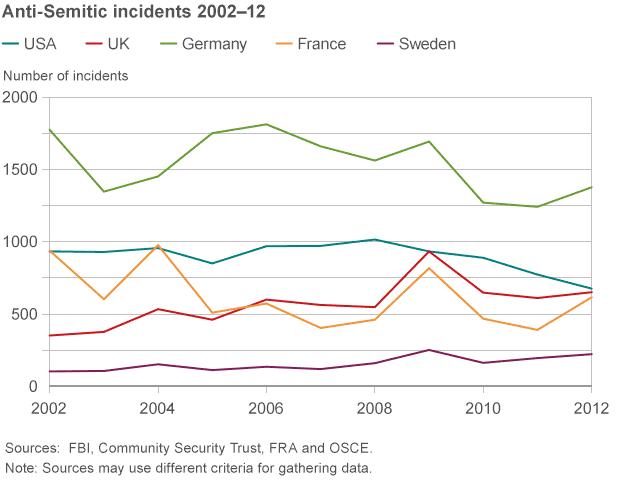In France and Germany, synagogues and Jewish community centres have been firebombed. In Britain, a rabbi was attacked near a Jewish boarding school. And in Australia, a bus carrying Jewish schoolchildren was targeted by teenagers shouting “Heil Hitler” and threatening to slit the children’s throats. But while anti-Semitism is clearly a problem, is it correct to say that it is increasing?, wonders BBC in an analysis.
 In Britain, the Jewish organisation the Community Security Trust (CST) monitors anti-Semitic incidents. These include violent attacks on people or property, threats, anti-Semitic graffiti and online expressions of anti-Semitism.
In Britain, the Jewish organisation the Community Security Trust (CST) monitors anti-Semitic incidents. These include violent attacks on people or property, threats, anti-Semitic graffiti and online expressions of anti-Semitism.
The CST says it received around 240 reports of anti-Semitic incidents in July, which it describes as five times the monthly average. The UK Association of Chief Police Officers, which has released statistics on hate crime since 2009, has talked of a “significant rise” in anti-Semitism since the latest fighting began in Gaza in early July.

“Looking at previous conflicts, such as the Israeli offensive in Gaza in 2008-2009, anti-Semitic incidents do seem to rise in their wake, before falling again. But it could be that some of that rise is because in times of conflict people are also more aware of anti-Semitism, and more likely to report incidents which previously would have gone unreported. The CST also reported 304 anti-Semitic incidents in the first six months of this year, an increase of 36% compared with the same period of 2013, says BBC.
“Over the longer term, 2013 saw the lowest annual number of anti-Semitic incidents in Britain since 2005. During the past decade the levels have fluctuated making it difficult to identify a long term trend – although the number of incidents has declined steadily from a peak in 2009 to the end of 2013, it is higher than it was 10 years ago, the report adds.
What about Europe? The European Union Fundamental Rights Agency (FRA) publishes a report every year summarising data on anti-Semitic incidents supplied by governments and NGOs. The problem is that only around half the EU states collect this data, and the quality varies hugely. “It is very incomplete – it’s really difficult to tell trends over time at present,” says FRA spokesperson Katya Andrusz told BBC.
“In the countries with better data, the picture is mixed. In Germany anti-Semitic acts declined in the decade to 2011, before rising slightly in 2012. In Sweden the trend has been upwards, although the overall number of incidents is low. In France, concerns about anti-Semitism have been raised by a number of high profile incidents including the killing of a teacher and three children at a Jewish school in Toulouse in 2012. There, the official data also shows the number of incidents has fluctuated up and down, trending downward in the decade to 2012 before rising that year.”Elsewhere, in the US, which is home to almost 70% of the world’s Jews who live outside Israel, statistics from the FBI and Jewish organisation the Anti-Defamation League (ADL) both show a steady long-term decline in anti-Semitic incidents – according to the ADL they were down 19% in 2013 compared to the previous year,” the report adds.